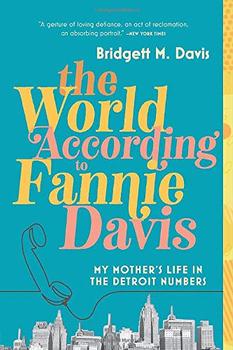Summary | Excerpt | Reviews | Beyond the Book | Readalikes | Genres & Themes | Author Bio

My Mother's Life in the Detroit Numbers
by Bridgett M. Davis
I marvel at the grandeur of my aunt's claim, that with a 500-to-1 payout, Mama hit for $25,000 or more. This she did in the city already known as Hitsville, USA, thanks to Berry Gordy and his winning Motown Records. That amount was easily more than a decade's salary for my father, a factory worker.
"Fannie was just lucky," says Aunt Florence. And then she explains her sister's big hit this way: "It was because she gave so freely. That's why Fannie had such good luck."
I'd heard this about my mother my entire life, that she was a lucky woman, and that her luck was a direct consequence of her generosity. The two are entwined in her sister's and others' minds, one explaining the other. I've come to believe my mom's luck was in fact preparation meeting opportunity. As for her big hit, no one is certain exactly how much money my mother played on 788 that day, because she never told anyone. I'm sure she was happy to let everyone believe she won many, many thousands of dollars, neither confirming nor denying the story. She would love that her good fortune all those years ago has now become a legend, one made more engaging because she hit with a man whose name was Wingate.
This I do know: She did give freely, and she did win big; and whatever the amount, it was enough to change the trajectory of our family's fortunes. With her winnings, Mama decided to buy a house.
She considered buying a home in Conant Gardens, the all-black, exclusive enclave of doctors, ministers, funeral parlor owners, and lawyers, i.e., the black bourgeoisie; but that wasn't her crowd. Besides, she had little use for separate but so-called equal. My mother understood from her Southern roots a basic principle that still holds true: where there's a white presence, there will be amenities. She wanted grocery stores with quality produce and roads that got repaired and streetlights that came on magically at dusk and garbage that got collected on time. She believed that as long as her children sat beside white classmates in a public school, we'd all receive a decent education. "I pay the same taxes," she used to say. "I should have the same benefits."
The year was 1961, and because a sweet irony was occurring, she had options: Detroit's black residents were finally winning their legal fight to live where they wanted, thanks to the efforts of the Detroit chapter of the NAACP, which was the largest in the nation, and interestingly, believed to be funded heavily by the city's number runners. Rather than live beside black neighbors, upper-middle-class residents who could afford to fled the city for the suburbs; that flutter of white flight meant they had to sell their houses to black buyers.
My mother fell in love with one of those houses, a three-story, four-bedroom New England–style Colonial red brick with a big backyard, on a tree-lined wide avenue appropriately named Broadstreet. The house was in an area on the city's west side called Russell Woods, where white clerks, engineers, accountants, midlevel white-collar workers, and businessmen all once lived. Other houses on the block were in a variety of architectural types, one a mock French château, another a Tudor style, and others replicas of formal Georgian estates. All of them were designed to be small-scale versions of the more elaborate houses of the auto execs and bankers and doctors and lawyers who lived in the tonier neighborhoods throughout the city. A pretty park was nearby. Winterhalter, a good elementary and junior high school, was just four blocks up the same street. Mackenzie High was not much farther.
The curb appeal was irresistible: The house's front porch was wide and generous, beneath a striped awning. Its front door was spectacularly curved at the top, with a heavy brass circular knocker, a molded animal head at its center. It could've been the door of a small castle. The tall, rectangular leaded-pane windows were each adorned with stained-glass designs etched across the top, and the front porch's iron balustrade had curving balusters both decorative and protective. Even its address was appealing, five whimsical dark digits tumbling across a white plaque: 12836.
Excerpted from The World According to Fannie Davis by Bridgett M Davis. Copyright © 2019 by Bridgett M Davis. Excerpted by permission of Little Brown & Company. All rights reserved. No part of this excerpt may be reproduced or reprinted without permission in writing from the publisher.
Your guide toexceptional books
BookBrowse seeks out and recommends the best in contemporary fiction and nonfiction—books that not only engage and entertain but also deepen our understanding of ourselves and the world around us.